Drug policy
- Bulgaria’s National Anti Drug Strategy (2014- 2018) addresses issues relating to illicit drugs.
- The Strategy has a two pillar structure covering drug demand and drug supply reduction
- The strategy’s demand reduction goals are to improve the health and social functioning of individuals; to protect society from drug markets; and to reduce the demand for illicit drugs.
- The strategy’sdrug supply reduction goals areto increase the efficiency of law enforcement and supervisory authorities; to prevent drugrelated crimes; and to ensure effective cooperation and coordination.
- Bulgaria adopts an illicit drugs focus.
Treatment and Recovery Services
- There is a government unit responsible for treatment servicesor alcohol and drug use disorders separately
- Drug treatment in Bulgaria is mainly focused on opioid users.
- The National Centre for Addictions (NCA) is the main body responsible for organising drug treatment.
- Treatment is delivered in inpatient, outpatient settings.
- Both public and private institutions deliver drug treatment.
- Treatment available includes detoxification and opioid substitution treatment, and psychosocial rehabilitation programmes.
- Prisoners who exhibit symptoms of drug or alcohol dependency may be subject to mandatory treatment including methadone maintenance treatment (MMT) and programmes based on cognitive behavioural therapy.
Prevention Services
- Environmental strategies are delivered primarily through the education system. The main focus is to impart information about the impact of drug use, to help young people to develop life skills and promote peer support. There are also specific parenting and family interventions available.
- There are several prevention and intervention centres that support municipal drug councils to implement drug prevention policies.
- Selective prevention programmes target particularly at risk groups such as children with special educational needs and young people from ethnic minority communities.
- There is a telephone helpline service that can be used as a source of information and emotional support.
- Several harm reduction programmes, operated by nongovernmental organisations (NGOs), provide both fixed and out reach services. The services provided include information and training on safe injecting, safe sexual behaviour and the prevention of overdoses and infectious diseases; testing for blood-borne infections; and needle and syringe programmes.
Recent Knowledge Share content about Bulgaria
Currently there is no Knowledge Share content from Bulgaria.
